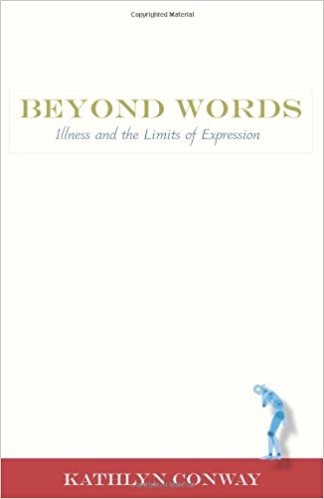
by Deborah Harris

Published by University of New Mexico Press, 2013 | 184 pages
Before the doping scandal and media circus that were to follow, Lance Armstrong embodied the deification of the terminal illness survivor. The particular form that this deification took (the Livestrong wristband, etc.) evinces, to say the least, an American cultural obsession with defying death and illness, with what the bioethicist Carl Elliott has called the “better than well.” Kathlyn Conway’s Beyond Words: Illness and the Limits of Expression is an examination of this particular American fixation and the narrative form with which it is most powerfully associated: the “triumph narrative.”
The triumph narrative, Conway argues, dominates stories of illness in American popular media, and, subsequently and crucially, distorts patients’ experiences of their own illness. Conway counters the rhetorical and fetishized triumph narrative with one that attempts to engage truthfully and wholly with illness and impending death. The direct, unflinching encounter of the severely or terminally ill with their mortality, Conway suggests, makes possible the disruption of the common illusion of immortality. In doing so, she argues, it opens a door onto a second world, one that is beyond words, vulnerable and radiant with life precisely to the degree that it acknowledges itself to be already within the shadow of death.
Conway is a practicing psychotherapist in New York and a survivor: at twenty-six she was treated for Hodgkin’s disease; at forty-three she was treated for breast cancer; and at forty-six she received chemotherapy for Hodgkin’s once again. In a previous work, Ordinary Life: A Memoir of Illness (2007), she reflected on surviving breast cancer. Beyond Words, in many ways an afterword to Ordinary Life, is a reflection on the experience of writing that memoir, an examination of the cultural refusal to acknowledge suffering and death that Conway finds to be the primary cause of this dissatisfaction and disappointment. “I searched for stories written by people like me,” she writes, “yet most of these books left me unsatisfied.”
Conway’s analysis relies heavily on Sontag’s Illness as Metaphor, arguing that our language of pain and illness is (necessarily) highly metaphorical, juxtaposing life and death into opposed binaries, good versus evil. The progression of the analysis, here and in Sontag, from the patient’s experience of the body to the problem of linguistic expression, leads directly to the fact of the impossibility of linguistically expressing the phenomenological fact of suffering and death, of the beyondness of the words that would be required to do so. The situation is not a trivial one: Conway diagnoses this symbology as profoundly detrimental to our individual and societal emotional wellbeing. For while the patient struggles to find the language adequate to describe her feelings and experience, the ubiquity of the triumph narrative simultaneously instills upon them a dubiously hopeful rhetoric of “triumph” and survival.
Beyond Words takes its place among those texts that seek to capture the extremities of human experience. It elicits comparison, for example, with the works of Tim O’Brien, author of fictional and nonfictional accounts of the Vietnam War and archaeologist of post-traumatic stress disorder. O’Brien’s work, like Conway’s, juxtaposes silence and graphic testimony and expresses the limits of language and the tenuousness of truth. Just as O’Brien’s works suggest that war stories are inherently fictional, that language itself is insufficient to capture the reality of armed conflict, Conway here suggests that triumph narratives are inherently false in their metaphoricity, are inadequate at conveying the reality of illness and death.
In its attempt to convey the expression of the inexpressible, Beyond Words performs what amounts to a secret, formless, and metaphorical language of illness and death. As such it presents real difficulties to those who have not dealt personally with serious illness. Conway’s text seems to suggest, despite her own intentions, that access to this realm may not be possible for all. Indeed, in more ways than one, Beyond Words is a decidedly unhopeful and antagonistic revision of triumph narratives, shaped instead by stories wholly engaged with suffering. Conway: “The books I have chosen to discuss in the pages that follow represent the beginnings of that different kind of story. Their authors do not gloss over the devastating experiences and damaged sense of self that grave illness or disability often entails.” Nevertheless, Conway insists that it is precisely these stories, those which most honestly engage with their subject, which most closely approximate the beyondness of the reality of illness, that offer the greatest therapeutic potential. Conway’s text is a cri de coeur that the honest description of pain and fear is not only a crucial therapeutic endeavor, but also a necessary vehicle in the conveyance of the beyondness of death and life. Only then are worldviews transformed.
Deborah Harris is a lecturer in the Writing Program at University of California, Santa Barbara. Her book, Media and the Rhetoric of Body Perfection: Cosmetic Surgery, Weight Loss, and Beauty in Popular Culture(released January 2014, Ashgate Publishing) explores the cultural obsession with perfection and the transformation imperatives advertised by the media, especially in the West. She has also published on topics such as composition pedagogy and plagiarism software.















click to see who
MAKE Magazine Publisher MAKE Literary Productions Managing Editor Chamandeep Bains Assistant Managing Editor and Web Editor Kenneth Guay Fiction Editor Kamilah Foreman Nonfiction Editor Jessica Anne Poetry Editor Joel Craig Intercambio Poetry Editor Daniel Borzutzky Intercambio Prose Editor Brenda Lozano Latin American Art Portfolio Editor Alejandro Almanza Pereda Reviews Editor Mark Molloy Portfolio Art Editor Sarah Kramer Creative Director Joshua Hauth, Hauthwares Webmaster Johnathan Crawford Proofreader/Copy Editor Sarah Kramer Associate Fiction Editors LC Fiore, Jim Kourlas, Kerstin Schaars Contributing Editors Kyle Beachy, Steffi Drewes, Katie Geha, Kathleen Rooney Social Media Coordinator Jennifer De Poorter
MAKE Literary Productions, NFP Co-directors, Sarah Dodson and Joel Craig